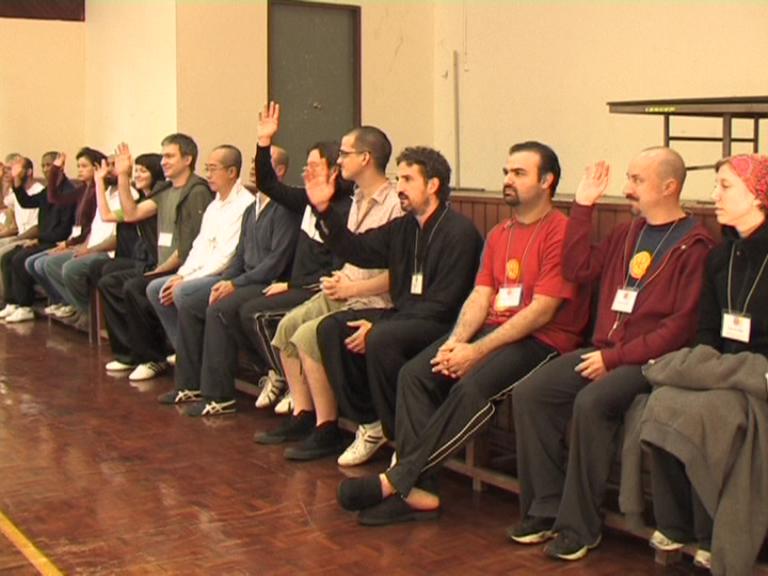THE BENEFITS OF OUR INTENSIVE CHI KUNG COURSE

An Intensive Chi Kung Course in Sabah
Question
The Intensive Chi Kung Course in Sabah was indeed a memorable experience and as Sifu has reminded us, I will certainly try to practice, practice and practice!
— Dr Nurlia, Malaysia
Answer
Although different masters may have different philosophies and methodologies, the one thing that all of them would agree is the indispensable requirement to practice, practice and practice if one wishes to be proficient in any art.
Masters are made from practice, not from learning. If one keeps on learning, even for a life-time, he will still remain a learner or student.
No matter what techniques a person has learnt, if he practices them long enough, he will master the techniques. There are two important points about this fact — though many people may not be aware of them or appreciate their importance.
One, if he starts with low-level techniques, he will eventually become a master of low-level techniques. If he starts with high-level techniques, he will eventually become a master of high-level techniques.
Two, if his methodology is inferior, he will take a long time to master the techniques. If his methodology is superior, he will take a relatively short time.
These two points are obvious, but actually most people today, probably in the past too, practice low-level techniques using inferior methodology. This is one main reason why most people do not get good results even if they have practiced chi kung for many years.
This applies to Shaolin Kungfu and Taijiquan too. The majority of those who have practiced Shaolin Kungfu and Taijiquan for ten or twenty years cannot effectively use their art to defend themselves. Similarly the majority of those who have practiced chi kung for a long time are not bouncing with good health and vitality. The pitiful fact is that most of them do not even realize this.
We in Shaolin Wahanm are lucky. Not only we realize this, we put it into practice. Hence, we choose the best available techniques and the best available methods for our training. For example, concerning techniques, if we want to generate an energy flow we choose “Lifting the Sky”, if we want to develop internal force we choose “Pushing Mountains”, and if we want to cleanse ourselves we choose “Carrying the Moon”.
Regarding methodology, we choose the best available approaches. We are clear about our aims and objectives, and know how best to realize them. We do not just start our exercise, but create the best conditions physically, emotionally, mentally and spiritually to do so. For instance, physically we make sure we are upright and relaxed, emotionally we let go, mentally we do not think of irrelevant thoughts, and spiritually we smile from our heart.
We realize that techniques are means, not ends by themselves. After performing “Lifting the Sky” for a number of times, for example, while most other practitioners would end their training session, we go into chi flow to reap the benefits of our practice. Then we keep still to enjoy the stillness while letting chi accumulate at our dan tian, before performing facial and point massage to complete our training.
Hence, while an uninformed practitioner may practice “Lifting the Sky” as physical exercise, we practice it as chi kung, or energy exercise. As physical exercise he expends energy, and if he tenses himself physically and mentally, which he is likely to do if he has not been properly trained, he ends up not only with less energy but also with more physical and mental blockage, though these adverse effects are usually not serious enough for him to notice. But if these adverse effects accumulate for some time, they can be harmful but insidious.
In our case, among other benefits, we clear our blockage with our chi flow, increase our vitality with the gradual accumulation of chi at our dan tian, improve mental clarity by clearing irrelevant thoughts that suffocate the mind, and let our spirit expand by smiling from our heart.
As it has happened a few times in some public discussion forums, some people may accuse us for speaking condescendingly on other methods (instead of thanking us for sharing our secrets). We would not want to waste time on their opinion. Of course we do not speak condescendingly on others. We respect other people's right to their opinions and methods even when they differ from ours.
But we need to make some comparison so that our own students can see the difference and gain the best benefits from our teaching. We also want to help others who sincerely wish to follow our philosophy and methodology to gain benefits from them.
The above is taken from Question 1 of October 2004 Part 1 of the Selection of Questions and Answers.
LINKS
Courses and Classes
